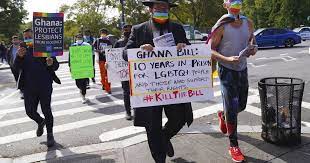A contentious measure that seeks to criminalize LGBT activities and advocacy is now being debated in Ghana. This might have significant repercussions for the technology industry and its potential partners.
Concerning the recent Anti-LGBT bill
The measure, which has been given the title “The Promotion of Proper Human Sexual Rights and Ghanaian Family Values Bill 2021,” was presented to parliament in the month of July 2022. It has been met with considerable opposition from various human rights groups, activists, and even some governments in other countries.
Any individual who identifies as LGBT, engages in same-sex relationships, supports or promotes LGBT rights, or offers services to LGBT individuals would be subject to the sanctions that are proposed by the law.
In addition, the measure makes it illegal for any type of media or online platform to promote positive portrayals of LGBT people or to provide information about LGBT rights and issues.
Those who are opposed to the proposed bill argue that it will infringe on fundamental rights such as freedom of expression, privacy, and the right to be treated equally, as well as foster an atmosphere that is unfriendly to creativity and collaboration.
They also express concern that the measure would discourage tech talent and investors from deciding to settle in Ghana as a location of their choice.
Read also: Facebook to erase sexuality, religion, and address from profiles
Policies of international technology companies regarding LGBTQ
The amount of Foreign Direct Investment (FDI) tha Ghana received in December 2021 grew by 524.3 million dollars. The government of Ghana is making an effort to entice additional international businesses, such as Amazon, to establish operations in the country.
However, the majority of the technology businesses that the Ghanaian government is approaching to persuade them to invest in the country have LGBTQ-friendly policies in place for its staff.
The Human Rights Campaign’s Corporate Equality Index awarded a flawless score to Amazon in 2022, placing it among the “Best Places to Work for LGBTQ Equality.”
In 1989, Microsoft included sexual orientation as a protected class in its non-discrimination rules. Since that time, the firm has provided employee benefits for same-sex domestic partnerships and has created an inclusive work environment for members of the LGBT community. In addition, Microsoft does not tolerate discrimination on the basis of sexual orientation.
Volkswagen started producing locally assembled automobiles in Ghana this year after opening an assembly plant there this year. The business was given the title of one of the 2018 Best Places to Work for LGBTQ Equality after receiving a score of one hundred percent on the Corporate Equality Index (CEI) and completing all of the CEI’s criteria on corporate policies and practised that are relevant to lesbian, gay, bisexual, and transgender workers. In addition, the business was awarded the title in 2018.
In the event that Ghana’s anti-LGBT law is enacted, advocacy groups may put pressure on businesses such as those named above to reevaluate their investments in the country.
The impact which Uganda had
This year, the government of Uganda introduced its anti-LGBT law, which contains tougher punishments for LGBT people.
These harsher sanctions include the death penalty for the offense of “aggravated homosexuality” and life imprisonment for the offense of “homosexuality.”
Firms such as Google and the Open For Business alliance, which is comprised of firms such as Microsoft, MasterCard, HSBC, and Meta, the company that owns Facebook, have all declared that the country’s law makes it “a concern for global businesses and investors operating or planning to invest” in the country in question.
